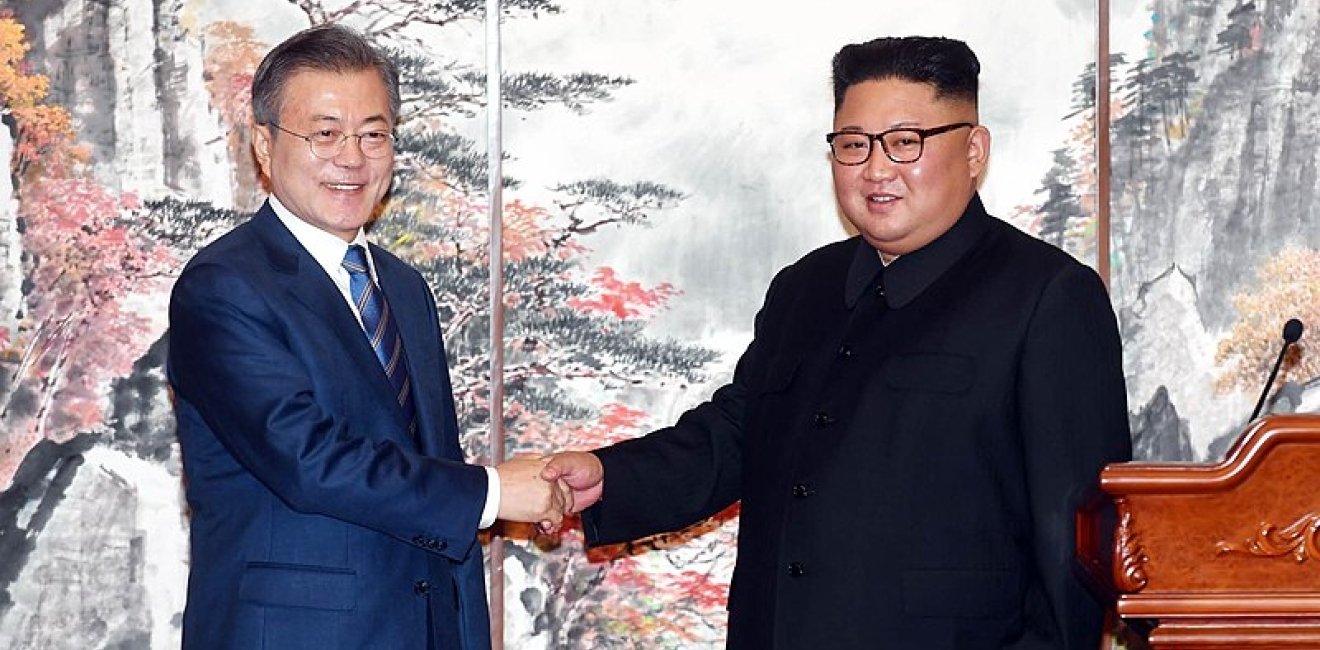The Storied Past of 'Denuclearization'
The word is not unique to the Korean Peninsula, but "denuclearization" could achieve new significance because of it.

A blog of the History and Public Policy Program
The word is not unique to the Korean Peninsula, but "denuclearization" could achieve new significance because of it.

The word is not unique to the Korean Peninsula, but could achieve new significance because of it.
Since taking office, the Trump Administration has demanded the “denuclearization” of the Korean Peninsula. President Donald Trump raised the stakes when he met with North Korean leader Kim Jong-un at a summit in Singapore in June 2018. Their joint declaration promised that North Korea would commit itself “to work toward complete denuclearization” of the region. An inter-Korean summit held in mid September reinforced the call to action.
But where did the word “denuclearization” come from, and is it unique to the dangerous situation currently found on the Korean Peninsula?
In a front-page op-ed in The New York Times entitled, “The Word That Could Help the World Avoid Nuclear War,” Jeffrey Lewis, the director of the East Asia nonproliferation program at the Middlebury Center of International Studies at Monterey, writes that the term “is more or less native to the Korean Peninsula” and “a relic from the 1990s.”
Yet a deeper dive into the history of the word “denuclearization” reveals a longer and more varied backstory. It also reveals that the denuclearization of the Korean Peninsula would bestow new significance upon the term.
The word “denuclearization” first emerged in the late 1950s in reference to Central Europe. It derived from the term “demilitarization,” which had most recently been used in a 1955 British arms control proposal for Central Europe as a means of reunifying Germany and aligning it with the North Atlantic Treaty Organization (NATO). Both East and West rejected that plan, but the idea of arms limitations in Central Europe endured.
In October 1957, Poland’s Foreign Minister Adam Rapacki proposed at the United Nations General Assembly the prohibition of nuclear weapons in East Germany, West Germany, Poland, and Czechoslovakia. Rapacki issued his proposal in response to the presence of U.S. tactical nuclear weapons in West Germany and potential plans to share nuclear weapons amongst NATO allies. Although Rapacki did not initially use the term “denuclearization” in the presentation of his scheme, within a few months the word became associated with the so-called “Rapacki Plan.”
The word itself did not have any special connotation in relation to the Rapacki Plan. Pundits used the term “denuclearization” synonymously with “atom-free zone,” “nuclear-free zone,” “nuclear disengagement,” “de-atomization,” and “limited disarmament,” amongst other phrases, to describe the contours of the Polish proposal. While some Western officials sympathetic to the Polish effort secretly encouraged Rapacki to abandon the term “disengagement” given its negative connotations in the West, both sides of the Cold War used the word “denuclearization” freely.
In one example, Nikolai Patolichev, a Soviet First Deputy Foreign Minister, used it in early 1958 as he dismissed a rumor that Moscow had established rocket-launching bases in Czechoslovakia, East Germany, and Poland: “It’s a lie. It doesn’t make sense for us to support the Rapacki plan for the denuclearization of Central Europe and build rocket bases at the same time,” he said. In another example, Canadian Undersecretary of State Jules Léger wrote in a secret cable of his worries that if the West rejected the Rapacki Plan outright, “neither the U.S. nor the U.S.S.R. will ever be able to agree to the denuclearization of any region in which nuclear weapons have already been placed.”
The West rejected the Rapacki Plan in 1958, but the issue of denuclearization in Europe persisted. It again rose to prominence in the early 1980s during the so-called Euromissiles Crisis, when proposals for the deployment of new generations of nuclear weapons in Europe sparked global protest. For example, George F. Kennan, the so-called father of the U.S. containment doctrine, penned an op-ed in The New York Times urging both sides of the Cold War to prohibit nuclear weapons from Central and Northern Europe. As a point of emphasis, Kennan simply entitled his article “Denuclearization.”
The term, though, was hardly confined to the European theater during the Cold War. In November 1961, the United Nations passed a resolution that called on its members to “consider and respect the continent of Africa as a denuclearized zone” in the wake of French nuclear testing in the Sahara Desert. The occasion seemingly marked the first time that the word formally entered into the international legal lexicon, as it was never used when twelve nations made Antarctica the world’s first denuclearized zone in 1959. However, given that key nuclear nations like Great Britain, France, and the United States abstained from voting on the African initiative, the gesture had limited significance.
A more notable achievement occurred later in the decade, when Latin America became the first denuclearized zone in an inhabited region. The negotiations took place amongst 21 nations under the auspices of the Preparatory Commission for the Denuclearization of Latin America. The nations gathered had planned to call the final agreement the “Treaty for the Denuclearization of Latin America,” but in February 1967, only two weeks before the Treaty opened for signature, Brazil suggested that the title be changed.
Brazil had been the first to use the word for Latin America in the fall of 1962, initially as a proposed extension of the African effort and then as a solution to the Cuban Missile Crisis. With the missiles removed from Cuba, Brazil claimed by 1967 that the term was outdated for the region. Moreover, Brazil believed that the term “offered some ambiguities” and failed to account for the desire of Latin American peoples to use nuclear energy for peaceful purposes. This observation had controversial undertones, as Brazil (and some others) fought to have the right to “peaceful nuclear explosions” (PNEs) under the Treaty, which would allow the use of nuclear explosive devices (all but indistinguishable from nuclear weapons) for large-scale civil engineering projects. In the end, the title was changed to the “Treaty for the Prohibition of Nuclear Weapons in Latin America,” and the right to PNEs remained disputed.
Even within Asia, the term is not unique to the Korean Peninsula. As early as January 1958, Japanese socialist politicians called for an “Asian denuclearized zone” in the mold of the pending Rapacki Plan. U.S. officials worried that the proposal might include such key U.S. allies as Japan, Taiwan, and South Korea. Nor did the term suddenly appear in the early 1990s specifically for the Korean Peninsula. For example, in September 1986 North Korea hosted delegates from more than eighty nations at the “Pyongyang International Conference for Denuclearization and Peace on the Korean Peninsula” as a ruse for its own nuclear aspirations.
Nevertheless, the use of the word for the Korean Peninsula has specific meanings. Lewis makes the important point that experts have intentionally used the term “denuclearization” over “disarmament” in order to capture the complexity of the situation on the Korean Peninsula, which includes the legacy of U.S. nuclear weapons in the region and the “nuclear umbrella” of extended deterrence the United States provides South Korea. Meanwhile, North Korea adheres to a unique interpretation of “denuclearization,” one that aspires to the “opacity” of Israel – possess nuclear weapons, but do not flaunt them.
Should the key parties prohibit nuclear weapons on the Korean Peninsula, the word “denuclearization” would achieve new significance. No regional denuclearization agreement has ever removed an indigenous nuclear weapons capability. The Treaty of Pelindaba, which formally denuclearized Africa in 2009, opened for signature in 1996, three years after South Africa became the only nation ever to renounce its nuclear weapons.
Likewise, the denuclearization of the Korean Peninsula would be unprecedented for the United States. The U.S. has never led the creation of a denuclearized zone in an inhabited region (it did, more or less, for the uninhabited regions of Antarctica, outer space, and the seabed). Following the dissolution of the Soviet Union in the early 1990s, the United States helped to lead the removal of Russian nuclear weapons from former Soviet satellite states like Belarus, Kazakhstan, and Ukraine, but these arrangements did not establish regional denuclearized zones. Neither did the 1990 Treaty on the Final Settlement with Respect to Germany, despite its prohibition of nuclear weapons from Berlin and the territory that had comprised East Germany.
Before Trump, the United States had also never called for a summit for the purposes of regional denuclearization. In 1958, the United States rejected Soviet calls for a summit in part because the Rapacki Plan appeared to be “the only idea seemingly approaching negotiability.” In this sense, Trump’s approach is already groundbreaking.
As many experts have pointed out, the denuclearization of the Korean Peninsula remains unlikely. Nuclear weapons provide North Korea with security and prestige, while the United States could be reluctant to undermine the protection it provides South Korea. North Korea’s demand for linking regional denuclearization with a formal agreement to end the Korean War further complicates the situation. If both sides can somehow agree to “ban the bomb” from the Korean Peninsula, though, it would undoubtedly help to make the world a safer place.
Less noticeably, it would also bestow new significance upon the word “denuclearization” beyond a storied past.


A leader in making key foreign policy records accessible and fostering informed scholarship, analysis, and discussion on international affairs, past and present. Read more


The Nuclear Proliferation International History Project is a global network of individuals and institutions engaged in the study of international nuclear history through archival documents, oral history interviews, and other empirical sources. Read more


The Cold War International History Project supports the full and prompt release of historical materials by governments on all sides of the Cold War. Read more



